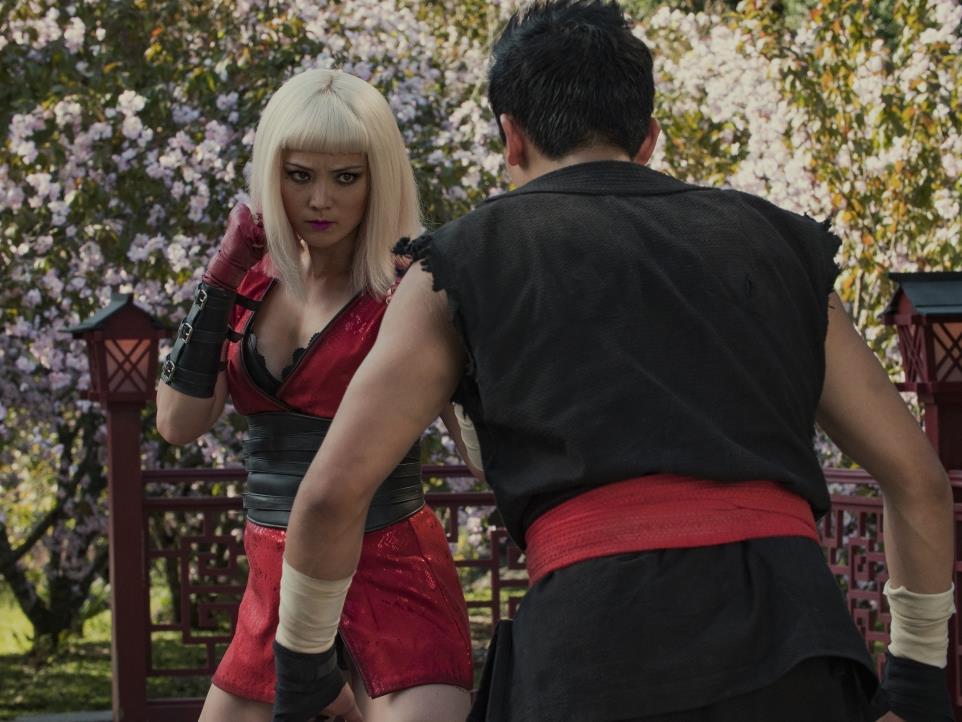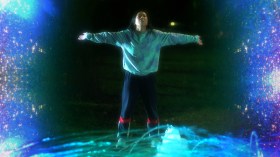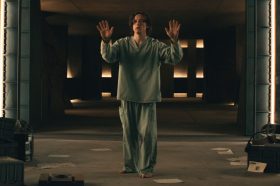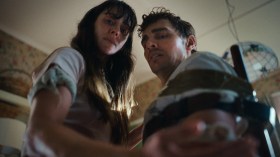Image: Black Mirror Season 5. Photo credit: Pedro Saad/Netflix.
By now, the story template for Charlie Brooker’s Black Mirror (which began in 2011) has become almost as fixed as The Twilight Zone or similar episodic series. The setting for each of its tales is more or less the present day, perhaps slightly into the future, where everything seems to be exactly like our world – except for one or two details (a gadget here, a corporation there) that has been pushed and exaggerated into futurity. And it is usually from this little difference that a collective catastrophe unfolds – thereby casting everything else that we may take for granted in our daily modern lives into a critical light. Like much fantasy and science fiction, Black Mirror is less a crystal-ball speculation about what technology will be like tomorrow (in the vein of Stanley Kubrick’s 2001: A Space Odyssey), and more an ongoing allegory about what is already coming apart today.
Black Mirror is now in its fifth series, following on from last year’s fairly underwhelming “special interactive feature-length event”, Bandersnatch. Although Brooker and his talented collaborators sometimes fall into the trap of repeating themselves, they have devised ingenious ways of keeping the overall concept surprising and fresh. The show never slots into the groove of any one genre but dances, from episode to episode, across many: horror, thriller, action, comedy, surrealism.
This new series comprises only three episodes. Like in the fourth series from 2017, Brooker uses the Netflix production connection to build an intriguing, cosmopolitan mesh of British and American elements. All the characters in “Striking Vipers”, for instance, are black Americans: in the “ten years later” format common to many Black Mirror tales, we follow them from the boozy dance clubs of their youth into the tense disquiet of marital, middle-class respectability. “Smithereens” (no relation to Susan Seidelman’s 1982 film of that title) is the story of a cab driver (played well by Andrew Scott) in London but, by the end of his complicated journey, he is connected by phone to corporate USA guru Billy Bauer (Topher Grace), who just happens to be on a “no-tech detox retreat” atop a mountain in Utah. “Rachel, Jack and Ashley Too”, finally, plunges us into a very American world of pop music showbiz – in which the young teen fans of the ever-upbeat Ashley (Miley Cyrus) have no clue how far the star’s minders will go in order to exploit and even (in a certain sense) “clone” her.
All Black Mirror stories depend on their often devilish revelations, twists and turns, so I won’t spoil any of those here. But it is fascinating to observe how finely its creators play with the expectations and moods aroused by each genre that is, in turn, evoked. Where “Smithereens” (directed by James Hawes) kicks off in a vein of urban realism, with an air of cryptic mystery that fleetingly evokes the films of Belgium’s Dardenne brothers, “Rachel, Jack and Ashley Too” (directed by Norway’s Anne Sewitsky) dives into the type of high-spirited, cartoonish fun aptly reminiscent of Cyrus’ Disney days as Hannah Montana. The deployment of action scenes involving cars marks a pointed comparison between these two episodes: whereas the former hinges on the gruesome details of road trauma, the car chase in the latter is the kind of scene where nobody ever gets hurt, vehicles just swerve around a lot at high speeds, and a few rubbish bins are knocked over. And while personal depression figures centrally in both stories, matters of life and death are the stuff of drama in one, and of magical, sci-fi fairy tale in the other. The “Ashley Too” alluded to in the episode’s title is a delightful invention that I leave you to discover for yourself.
“Striking Vipers” (directed by Owen Harris) shows Brooker making a cautious move toward embracing LGBTQ content. Where “Smithereens” is about all-consuming “app” culture and “Rachel, Jack and Ashley Too” imagines an extravagant extension of pop franchise marketing, this first story in the new series ruminates on the playing of video games (as did Bandersnatch, and several other Black Mirror tales of prior years – a well-worn terrain on which it is still hard to beat David Cronenberg’s splendid 1999 virtual reality phantasmagoria, eXistenZ). In the competitive games played between Danny (Anthony Mackie) and Karl (Yahya Abdul-Mateen II), the gender of the avatars they select is fluid: one can be a woman, the other a man. But what happens when the content of their shared narrative – now progressed well beyond remote-control joysticks into ultra-vivid cyber-immersion – ceases being about only Kill Bill-style aggression and violence? Although the best Black Mirror episodes (I’d include “Smithereens” in that pantheon) follow the consequences of their premises all the way through to the bright or bitter end, here Brooker pulls up short, frantically juggling the plot elements so as to somehow find a workable compromise between old and new worlds. The result is not entirely convincing.
This periodically happens in Black Mirror: sometimes it can become a bit pat and moralising, as if its storylines had been devised as a list of “talking points” for secondary school classroom discussion, but with the pedagogical conclusion too well-loaded in advance. Are we spending too much time online, and neglecting genuine, personal, intimate interaction? Have our media-fed fantasies become more real than our actual, physical existences? Are we projecting too much human personality onto technological gadgets, and too little into each other? Have we become hypnotised, robotic consumers, above all else? Are we letting the natural world slide into ecological disaster? … and so on. When the “correct side” of such debates (as rendered in narrative allegory) is too heavily signalled – this is my abiding problem with the much-loved TV version of The Handmaid’s Tale – then the “ideal viewer” is being relentlessly flattered. Black Mirror is better, on all levels, when it manages to put its issues – and its spectators – into a spin.
3.5 stars ★★★☆© Adrian Martin, June 2019
Black Mirror is available to watch on Netflix.
Actors:
Director:
Format:
Country:
Release:





